| Part of a series on |
| Punjabis |
|---|
 |
 Punjab portal |
Bhagat Jawala Dass Ji is a local Saint revered by the people of Lakhpur and the surrounding villages.
| Part of a series on |
| Punjabis |
|---|
 |
 Punjab portal |
Bhagat Jawala Dass Ji is a local Saint revered by the people of Lakhpur and the surrounding villages.
According to local tradition, Bhagat Jawala Dass Ji was born in Lakhpur, a village in Kapurthala. He was a devoutly religious man and lived an austere life. He would hold an annual gathering of religious figures which would last throughout the night. Presently, a religious gathering takes place annually to mark the tradition started by Bhagat Ji. His main shrine is in Lakhpur which is currently being reconstructed.
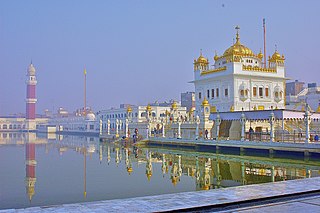
Tarn Taran Sahib is a city in the Majha region of the state of Punjab, in northern India. It is the district headquarters and hosts the municipal council of Tarn Taran district. Gurdwara Sri Tarn Taran Sahib, a prominent Sikh shrine, is located in the central part of the city.
Phagwara is a city and municipal corporation in the Kapurthala district of Punjab, India. It is located 40 kilometers from Kapurthala, the district headquarter, 124 kilometres (77 mi) away from Chandigarh, 20 kilometres (12 mi) away from Jalandhar and 361 kilometres (224 mi) from New Delhi. The city is famous for sugar, glucose, starch, fine fabric textiles, and auto parts manufacturing for engines in Punjab. This place is also known for the Shri Hanuman Garhi Temple, which has statues of the Hindu God, Lord Hanuman.

Bhagat Sadhna, also called Sadhna Qasai, was a north Indian poet, saint, mystic and one of the devotees whose hymn was incorporated in Guru Granth Sahib. Venerated in the region of Punjab, among Sikhs and Ravidassias, his devotional hymn is widely quoted by most preachers. His one hymn is present in Adi Granth Sahib, in Raga Bilaval.

Trilochan was a celebrated medieval Indian saint and one of devotee whose hymns are present in Guru Granth Sahib, the holy book of Sikhs.

Ravidas or Raidas (1267–1335) was an Indian mystic poet-saint of the Bhakti movement during the 15th to 16th century CE. Venerated as a guru in the modern regions of Uttar Pradesh, Bihar, Rajasthan, Gujarat, Maharashtra, Madhya Pradesh, Punjab, and Haryana, he was a poet, social reformer and spiritual figure.

Trilokpur is a Hindu temple site in Himachal Pradesh, India. It is located on an hillock about 24 km south-west of Nahan at an elevation of about 430 m. The temple is an amalgam of Indo-Persian styles of architecture.

Sakhi Sarwar is a town in Dera Ghazi Khan District, Punjab, Pakistan. It is named after a Muslim Sufi saint Syed Ahmad Sultan, also known as Sakhi Sarwar, whose tomb is situated in the vicinity.

Jwala Ji is a Hindu goddess. The physical manifestation of Jwala Ji is always a set of eternal flames, and the term Jvala means flame in Sanskrit and ji is an honorific used in the Indian subcontinent.
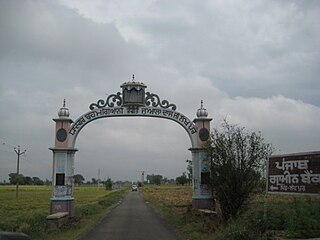
Lakhpur is a village near Sahni (Lakhpur-Sahni), Tehsil Phagwara, Kapurthala district, in Punjab, India.
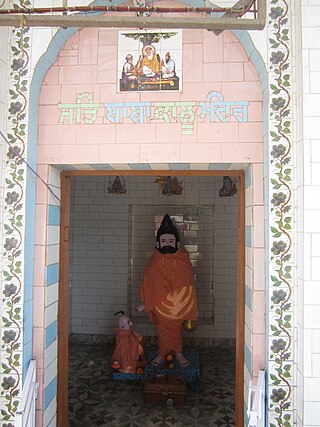
Baba Kalu is a local Saint revered by the people of the Hoshiarpur and Phagwara areas of the Punjab, India.
Pharala is a village in the tehsil of Nawanshahr, Nawanshahr district, in Punjab, India.
Sikhism has often been criticised by non-Sikhs regarding its texts, practices, and societal norms, but Sikhs and other scholars argue that these criticisms are flawed and are based on a biased and poor understanding of the texts, especially of the multiple languages used in the Sikh scriptures. They also argue that most western scholars who attempted to interpret eastern religious texts were missionaries and could not overcome the bias they carried with them, irrespective of whether they were translating the Quran, Vedas, Puranas or the Guru Granth Sahib. Guru Nanak rejected ritualistic worship and encouraged belief in one true God, Waheguru. The veneration and bowing to the Guru Granth Sahib, has often been interpreted by western scholars as akin to idolatry, as observed by the Hindu faith, which defeats the ideology of Guru Nanak. Other scholars dismiss Sikhism as, either consciously or spontaneously, a syncretism of the Hindu Bhakti and Muslim Sufi movements.
Ghoman or Ghuman is a village in Tehsil Sri Hargobindpur of Gurdaspur district of Punjab, India.
Nurpur Jattan is a village in Hoshiarpur district of Punjab State, India. It is located 35 kilometres (22 mi) from Hoshiarpur, which is both district and sub-district headquarters of Nurpur Jattan. This village comes under mahilpur police station and garhshanker (tehsil). Sabka sarpanch was sartaj singh sangra and now ajit singh Pannu elected as a sarpanch in recent election. This village is administrated by a Sarpanch, who is an elected representative.nurpur jattan has two sikh temples and a religious place which is known as bhagat charn dass ji. A fair held on every year in october in memory of bhagat charan daas ji. The village comprises an area of 208.54 hectares.
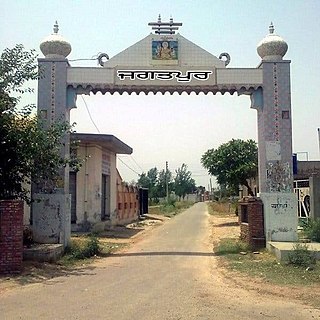
Jagatpur is a village in Shaheed Bhagat Singh Nagar district of Punjab State, India. It is 2.2 kilometres (1.4 mi) away from postal head office Mukandpur, 9.3 kilometres (5.8 mi) from Banga, 12 kilometres (7.5 mi) from district headquarters Shaheed Bhagat Singh Nagar and 113 kilometres (70 mi) from state capital Chandigarh. The village is administrated by Sarpanch an elected representative of the village.
Bhangal Kalan is a village in Shaheed Bhagat Singh Nagar district of Punjab State, India. Kalan is a Persian word for big and Khurd is a Persian word for small, when two villages have the same name they are distinguished by using Kalan or Khurd with the village name. It is situated on Bahara-Nawanshahr link road and located 6.7 kilometres (4.2 mi) away from postal head office Sahlon, 10 kilometres (6.2 mi) from Rahon, 3.3 kilometres (2.1 mi) from district headquarter Shaheed Bhagat Singh Nagar and 94 kilometres (58 mi) from state capital Chandigarh. The village is administrated by Sarpanch an elected representative of the village.
Lakhpur is a village in Shaheed Bhagat Singh Nagar district of Punjab State, India. It is located 3.1 kilometres (1.9 mi) away from postal head office Ladhana Jhikka, 21 kilometres (13 mi) from Nawanshahr, 16.5 kilometres (10.3 mi) from district headquarter Shaheed Bhagat Singh Nagar and 111 kilometres (69 mi) from state capital Chandigarh. The village is administrated by Sarpanch an elected representative of the village.
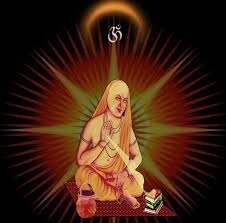
Nabha Dass, born as Narayan Dass, was a Hindu saint, theologian and author of the Bhaktamal. In this sacred scripture, Nabha Das wrote the life history of almost every saint ranging from the Satya Yuga to the Kali Yuga age. Nabha Dass wrote ‘Bhakatmal’ in 1585. Nabha Dass, a saint belonging to the tradition of Ramananda. On his birthday 8 April, millions of followers remember him and his resolve to work for humanity.

Guru Ram Rai Darbar Sahib is a Sikh place of worship in Dehradun, India, dedicated to Baba Ram Rai, eldest son of Guru Har Rai, the seventh of the ten Sikh Gurus. Baba Ram Rai settled here with his followers in the mid-17th century, after he was banished by the Sikh orthodoxy for mistranslating scripture in front of the Mughal emperor Aurangzeb, so as to not cause offence. It is believed the city, Dehradun, gets its name from the religious camp established by him: a "dera", or camp, in the "doon" valley.
Folk practices prevalent in Punjab incorporate local mysticism and refers to the beliefs and practices strictly indigenous to the Punjabi people, of the Punjab region including ancestral worship, veneration of saints, and local festivals. There are many shrines in Punjab which represent the folk religion of the Punjab region which is a discourse between different organised religions. These shrines represent inter-communal dialogue and a distinct form of cultural practice of saint veneration.